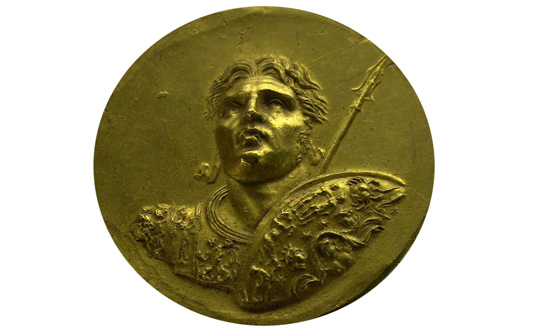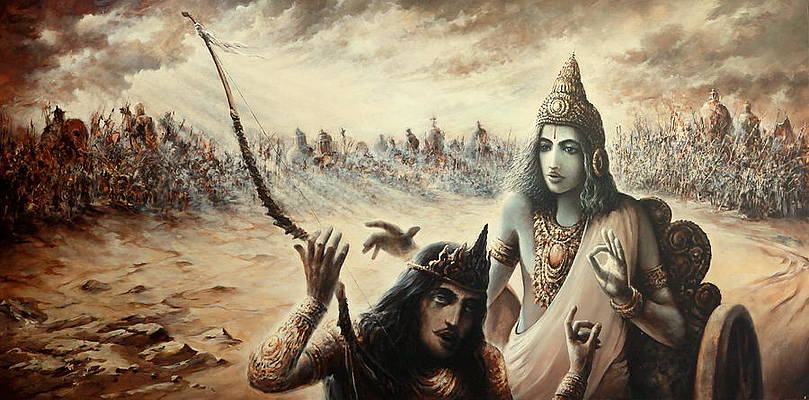Alexander was a symbol of European power who wished to conquer the world through violence and bloodshed. But did he really win the war against the mighty King Porus during the Battle of Hydaspes as has been taught to us in school or has history once again been glorified?
Nearly 2300 years ago, a formidable European army led by Macedonian King Alexander invaded India. After eight years of constant war and having conquered the Persian Empire, in the spring of 326 BC, Alexander crossed the Indus and seized Taxila (near the modern town of Attock, Pakistan). Alexander’s army then marched southward along the west bank of the Hydaspes river (presently known as Jhelum) until it reached a point near the Indian kingdom of Paurava. This kingdom, though smaller than Taxila, presented a greater threat to Alexander’s proposed line of march eastward further into India. It was important for Alexander to conquer this state if he wanted to move further. He sent a message asking for the submission of the King Purushottam/Puru (Greeks called him King Porus). The ruler refused and instigated the next stage in Alexander’s campaign.
Alexander knew his men would have no chance in a straight fight against Porus’s huge army. With 30,000 infantry, 300 chariots and 200 elephants, Porus’s soldiers waited on the other side of the river. Alexander, who was believed to have resorted to treachery to defeat Indian fortresses, took Porus by surprise. He got his forces in secret and attacked Porus. It was the first time Europeans and Indians looked into one another’s faces on a battlefield.
Greek contemporary writers describe the Battle of Hydaspes as the hardest fought of all Alexander’s battles. Porus fought valiantly. His army was wiped out. The Macedonian king asked him how he would like to be treated. “Like a King”, Porus replied, with calm dignity. Alexander took him at his word. He was so impressed by his rival’s bravery that he not only returned Porus’s kingdom back to him but also gave additional territory of various independent tribes whom he subdued.
Alexander had not always been so generous in his treatment of stubborn adversaries. As per Greek accounts, his post-Hydaspes charitable behaviour was uncharacteristic and unlikely. For, in battles before and after, he massacred everyone in the cities he conquered. Then, why did he do this to Porus?
Frank Lee Holt, a professor of ancient history at the University of Houston, writes in his book, Alexander the Great and the Mystery of the Elephant Medallions: “The only reference in Arrian’s history to a victory celebration by Alexander’s army was after the battle with Porus.” Alexander’s army did not indulge in celebrations after any of the battles they fought but the Battle of Hydaspes was an exception. The fact the Macedonians celebrated after the Battle of Hydaspes suggests they considered themselves extremely lucky to survive after the clash with the Indians and their elephant corps.
Perhaps, the Macedonians realized that at the Battle of Hydaspes, they were dealing with an enemy of uncommon valour. The Macedonian army had a system of rotation where large batches of veteran soldiers were released to return home with sufficient gold and slaves. In their place, fresh troops used to pour in from Europe. Despite this, the fierce resistance put up by the Indian defenders had reduced the strength and perhaps the will of the – until then all-conquering Greek army.
Greek historian Plutarch, in his illustrious biographical series ‘Parallel Lives’ describes Alexander’s victory: “As for the Macedonians, their struggle with Porus blunted their courage and stayed their further advance into India.” He adds, “the size of the Magadha’s army further east numbered 200,000 infantry, 80,000 cavalry, 8,000 chariots, and 6,000 war elephants, which was discouraging for Alexander’s men and stayed their further progress into India.”
It is obvious that Alexander’s men were not just exhausted and homesick but were frightened by the prospect of facing another giant Indian army. They mutinied and refused to march further East. Alexander had no choice but to buy peace with Porus to ensure a safe passage for himself and his troops.
Egyptologist and philologist E. A. W. Budge, in his epic volume, The Life and Exploits of Alexander, has given a vivid account of the Macedonian’s misadventure in India. According to Budge, “In the Battle of Hydaspes the Indians destroyed majority of Alexander’s cavalry. Realising that if he were to continue fighting he would be completely ruined, the Macedonian king requested Porus to stop fighting. True to their traditions, the magnanimous Indian king spared the life of the surrendered enemy. A peace treaty was signed, and Alexander helped Porus in annexing other territories to his kingdom.”
This suggests that the impact of Alexander’s march on India has been exaggerated out of all proportion to reality by historians of the colonial era.
The 1941 Hindi movie Sikandar showcasing the victorious Alexander chivalrously restoring the defeated Porus to his kingdom did as much to seal the myth of Alexander and his nobility as any colonial era history book.
Greek historian and geographer Strabo, questioned the trustworthiness of several Greek accounts on which much of this version of history is based. He complains in the Geographika that all who wrote about Alexander preferred the marvellous to the true. He writes: “Generally speaking, the men who hitherto have written on the affairs of India were a set of liars…Of this we became the more convinced whilst writing the history of Alexander.”
Indian-American mathematical scientist Dr. Navaratna Srinivasa Rajaram writes, “The notion of Greeks as superior to Indians and other non-Europeans was a conceit introduced by Europeans of the colonial period. To preserve this conceit of ‘European’ superiority, colonial officials made the Greeks all but the bringers of knowledge to India — a claim the Greeks themselves never made. As a first step, these ‘scholars’ turned what was Alexander’s disastrous defeat into a victory that somehow resulted in his ‘defeated’ opponent ending up with more territory! Alexander also had to face a mutiny by his supposedly ‘victorious’ army and forced to beat a hasty retreat that resulted in the near destruction of his army and his own premature death.”
Indian historians and writers often refer to the contribution made by famous Russian General and military thinker Marshal Gregory Zhukov in presenting a realistic picture of the Battle of Hydaspes. According to Zhukov, Alexander in his Indian campaign had fared far worse than Napoleon in Russia. In his convocation address delivered at the Indian Military Academy in Dehradun in 1957, Zhukov stated that Alexander’s conduct at the end of his battle with Porus showed that he had suffered a catastrophic defeat.
These views expressed by a Russian thinker are significant because unlike the prejudiced colonial and Western historians, the Greeks and, later, Romans viewed Indians differently. For instance, Arrian writes in Alexander Anabasis that Indians were the noblest among all Asians.
“If the people of Punjab and Sindh were fierce, then in the eastern part of India the men were superior in stature and courage”: Arrian
A careful examination of Greek and Roman sources like Plutarch reinforces Zhukov’s analysis.
All this is glossed over by Western historians, in whose view the one victory over King Porus amounted to the conquest of India.
References:
- Google Books:
– Plutarch’s Lives, Volume 2
– Alexander the Great: A New History
– Alexander the Great: A Reader
- Alexander vs Porus: Beyond the fog of war/Russia and India Report
by Rakesh Krishnan Simha
- In the footsteps of Alexander the Great: BBC Documentary
Image: Freeimages.com





